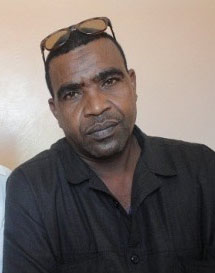All the radio stations wanted him, and for good reason–Abdi Jeylani Malaq was one of the most famous comedians in Mogadishu, and it was the holy month of Ramadan when the radio broadcasters hold quiz shows. Abdi had been in the business since 1989 and was in hot demand as a commentator for the competitions. He had just finished one such quiz show Tuesday evening at Radio Kulmiye, in the capital’s central region, and had left the station for home when two gunmen shot him five times in the chest and head, local journalists told me. He was pronounced dead from blood loss at Medani Hospital and was buried Thursday. “He was a great friend for me and for all Somali journalists,” recounted Abdalla Ahmed, a reporter for the private Mogadishu station Radio Risaale.
The gunmen did not bother to wear masks but fled the scene before police arrived, Ahmed told me. Speculation over the perpetrators is varied: Some believe it was Al-Shabaab insurgents, others suspect individuals in the government, and still others believe he may have been killed over business rivalry. Information Minister Abdikadir Hussein condemned the killing and said security agents are investigating the incident. But finding Abdi’s killers, and the murderers of three other journalists killed in Mogadishu this year, would be a momentous task–violence is rife, potential suspects are diverse and plentiful, and the government’s ability to conduct thorough investigations is limited. “Impunity in murders in Mogadishu is very high,” said exiled Somali journalist Mohamed Garane. “People know that they can get away with it and it occurs all too frequently.” Al-Shabaab’s deadly attacks on the public in the capital serve as a screen for others to conduct similar crimes.
Further, Abdi made fun of everyone and did it fearlessly. A few years ago he dressed up as a woman for a drama pretending he was looking for a date–some journalists said the drama highlighted how Al-Shabaab abuses the rights of Somali women. Al-Shabaab insurgents began to threaten the comedian over the phone, forcing him to flee his home in Mogadishu for Hargeisa in the semi-autonomous republic of Somaliland, where he stayed for a year. In other dramas, he and other comedians focused on the rifts between top Al-Shabaab leaders, Ahmed recounted. He also targeted some of the unscrupulous leaders within the Transitional Federal Government, taking jabs at individual officials for corruption, tribalism, and mismanagement in public office, local journalists told me.
“His comedy was like a message to the warring sides in the country,” Radio Kulmiye Deputy Director Mohamed Odowa told me. “In many ways he was a peace lover.” In May, officials from the semi-autonomous Puntland region invited Abdi to present dramas about peace in northeastern regions such as Garowe and Bosaso, Ahmed said. The international community, whose only reference to Somalia is seemingly interminable conflict and violence, is often unaware of the country’s thriving tradition of poetry and comedy. Perhaps conflict is why Mogadishu has so many comedians and dramatists: there is a need for humor and to convey sensitive messages indirectly.
And, as with journalists, it is often the best comedians and media personalities that are targeted. Another famous Somali comedian, Oday Abdulle, was forced to flee the country after receiving death threats. The tragic case of veteran radio journalist and dramatist Hassan Mohamed is another example of how media professionals in Mogadishu are targeted. Hassan managed the once-leading station HornAfrik and took care of the station’s extensive audio archives, but he was most famous for radio dramas that poked fun at Somali society and helped children cope with the conflict. After Al-Shabaab shot at him twice and tied and blindfolded him at his radio station, and he received numerous phone threats, Hassan fled to Nairobi in 2010. This year Hassan succumbed to a severe diabetic condition and passed away in exile in Kenya. “Humor is a crucial component for Somali’s welfare during these dangerous, humorless times,” Somali reporter Abdi Guled told me. “Sadly, Somalia lost another one of those crucial comics this week.”
